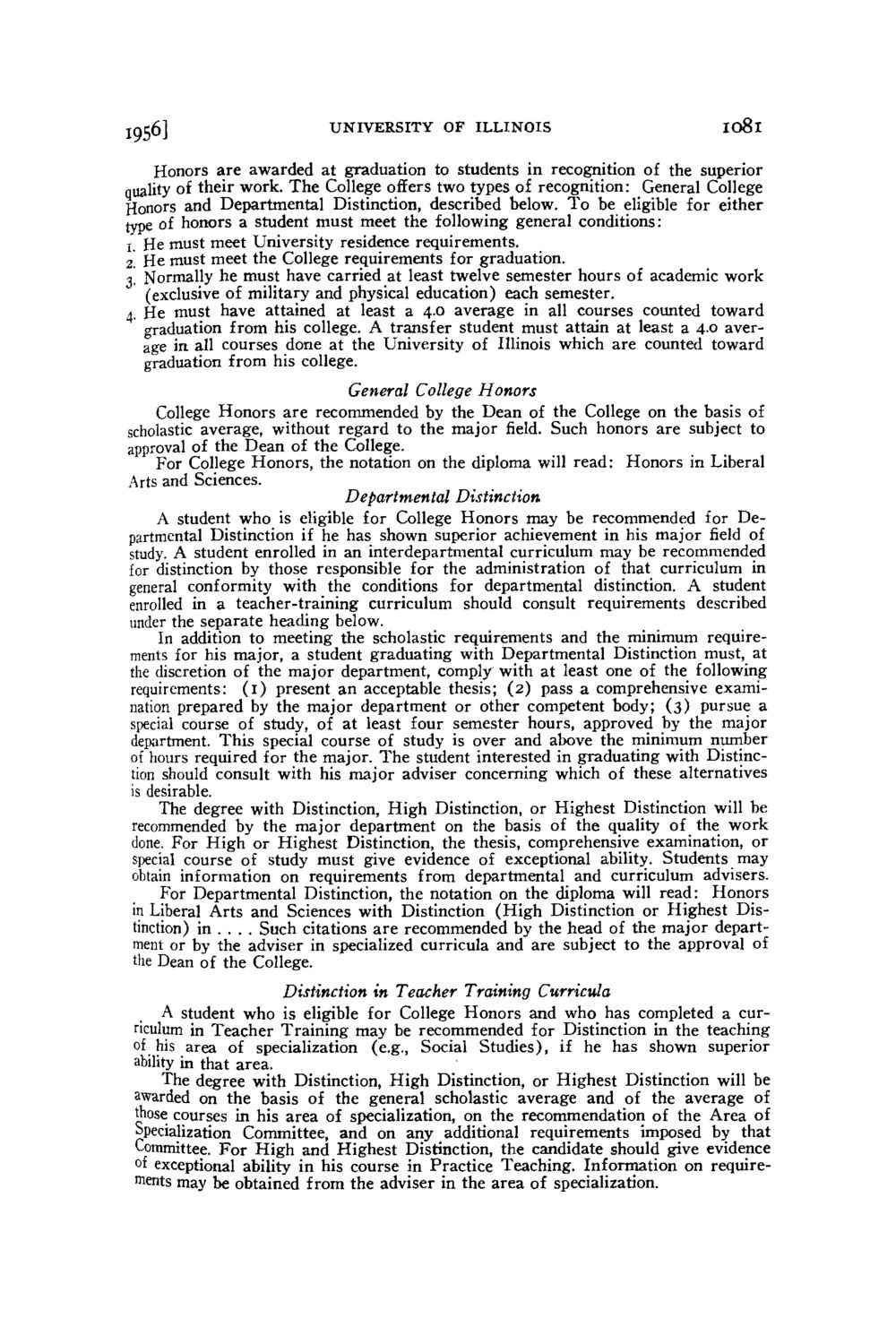| |
| |
Caption: Board of Trustees Minutes - 1956
This is a reduced-resolution page image for fast online browsing.

EXTRACTED TEXT FROM PAGE:
I956] UNIVERSITY OF ILLINOIS I08l Honors are awarded at graduation to students in recognition of the superior quality of their work. The College offers two types of recognition: General College Honors and Departmental Distinction, described below. T o be eligible for either type of honors a student must meet the following general conditions: 1. He must meet University residence requirements. 2. He must meet the College requirements for graduation. 3. Normally he must have carried at least twelve semester hours of academic work (exclusive of military and physical education) each semester. 4. He must have attained at least a 4.0 average in all courses counted toward graduation from his college. A transfer student must attain at least a 4 0 average in all courses done at the University of Illinois which are counted toward graduation from his college. General College Honors College Honors are recommended by the Dean of the College on the basis of scholastic average, without regard to the major field. Such honors are subject to approval of the Dean of the College. For College Honors, the notation on the diploma will read: Honors in Liberal Arts and Sciences. Departmental Distinction A student who is eligible for College Honors may be recommended for Departmental Distinction if he has shown superior achievement in his major field of study. A student enrolled in an interdepartmental curriculum may be recommended for distinction by those responsible for the administration of that curriculum in general conformity with the conditions for departmental distinction. A student enrolled in a teacher-training curriculum should consult requirements described under the separate heading below. In addition to meeting the scholastic requirements and the minimum requirements for his major, a student graduating with Departmental Distinction must, at the discretion of the major department, comply with at least one of the following requirements: (1) present an acceptable thesis; (2) pass a comprehensive examination prepared by the major department or other competent body; (3) pursue a special course of study, of at least four semester hours, approved by the major department. This special course of study is over and above the minimum number of hours required for the major. The student interested in graduating with Distinction should consult with his major adviser concerning which of these alternatives is desirable. The degree with Distinction, High Distinction, or Highest Distinction will be recommended by the major department on the basis of the quality of the work done. For High or Highest Distinction, the thesis, comprehensive examination, or special course of study must give evidence of exceptional ability. Students may obtain information on requirements from departmental and curriculum advisers. For Departmental Distinction, the notation on the diploma will read: Honors in Liberal Arts and Sciences with Distinction (High Distinction or Highest Distinction) in . . . . Such citations are recommended by the head of the major department or by the adviser in specialized curricula and are subject to the approval of the Dean of the College. Distinction in Teacher Training Curricula A student who is eligible for College Honors and who has completed a curriculum in Teacher Training may be recommended for Distinction in the teaching of his area of specialization (e.g., Social Studies), if he has shown superior ability in that area. The degree with Distinction, High Distinction, or Highest Distinction will be awarded on the basis of the general scholastic average and of the average of those courses in his area of specialization, on the recommendation of the Area of Specialization Committee, and on any additional requirements imposed by that Committee. For High and Highest Distinction, the candidate should give evidence of exceptional ability in his course in Practice Teaching. Information on requirements may be obtained from the adviser in the area of specialization.
| |